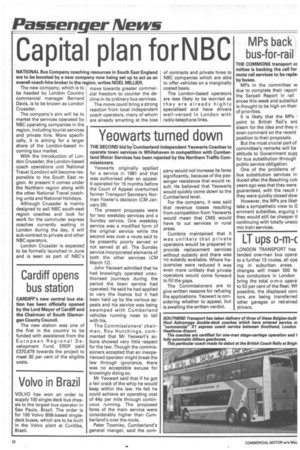Yeowarts turned down
Page 24

If you've noticed an error in this article please click here to report it so we can fix it.
THE SECOND bid biCumberland independent Yeowarts Coaches to operate town services in Whitehaven in competition with Cumberland Motor Services has been rejected by the Northern Traffic Commissioners.
Yeowarts originally applied for a service in 1981 and that was authorised after an appeal. It operated for 15 months before the Court of Appeal overturned former Transport Secretary Norman Fowler's decision (CM January 29).
The present proposals were for two weekday services and a Sunday service. One weekday service was a modified form of the original service while the second was over a route said to be presently poorly served or not served at all. The Sunday service incorporated elements of both the other services (CM March 12).
John Yeowart admitted that he had knowingly operated unauthorised journeys during the period the town service had operated. He said he had applied to vary the licence but it had been held up by the various appeals and his service was being swamped with Cumberland vehicles running nose to tail with his.
The Commissioners' chairman, Roy Hutchings, commented that Mr Yeowart's actions showed very little respect for the law. Though the commissioners accepted that an inexperienced operator might break the law through ignorance, there was no ' acceptable excuse for knowingly doing so.
Mr Yeowart said that if he got a fair crack of the whip he would keep within the law. He felt he could achieve an operating cost of 44p per mile through continuous running. The proposed fares of the main service were considerably higher than Cumberland's over the route.
Peter Townley, Cumberland's general manger, said the corn pany would not increase its fares significantly, because of the passenger resistance that would result. He believed that Yeowarts would quickly come down to the Cumberland level.
For the company, it was said that revenue losses resulting from competition from Yeowarts would mean that CMS would have to cut services in rural areas.
Cumbria maintained that it was unlikely that private operators would be prepared to provide replacement services without subsidy and there was no subsidy available. Where frequencies were reduced it was even more unlikely that private operators would come forward to fill the gaps.
The Commissioners are to give written reasons for refusing the applications. Yeowart is considering whether to appeal, but is awaiting the written verdict.
















































































































